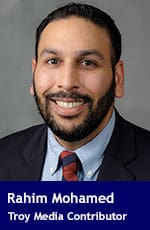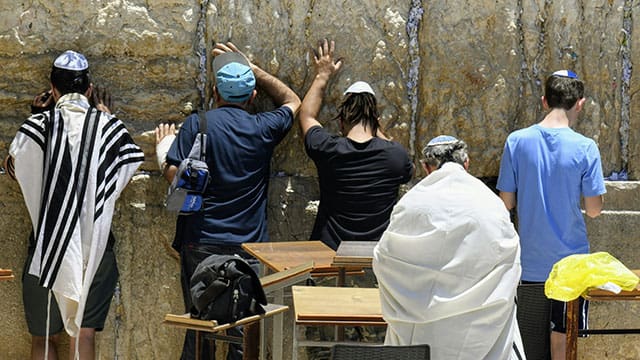Silence from Muslim leaders on Hamas atrocities raises alarm over interfaith relations in Canada
 Apr. 7 marks six months since Hamas launched a medieval onslaught of murder, rape and kidnapping in southern Israel, leaving 1,139 civilians dead, at least eight of whom were Canadians, and taking some 250 more hostage over what would end up being the darkest day for Jews since the Holocaust.
Apr. 7 marks six months since Hamas launched a medieval onslaught of murder, rape and kidnapping in southern Israel, leaving 1,139 civilians dead, at least eight of whom were Canadians, and taking some 250 more hostage over what would end up being the darkest day for Jews since the Holocaust.
While the carnage played out half a world away, Oct. 7, 2023, also marked a critical turning point for interfaith relations here in Canada, spurring a wave of public displays of religious intolerance – mostly targeting Jewish Canadians – that would have been unthinkable just days earlier. Synagogues, Jewish schools and even Jewish social institutions like Toronto’s Mount Sinai Hospital have regularly been targeted by demonstrators over the past six months, ostensibly in protest of Israel’s armed response against remnants of Hamas hunkered down in Gaza.
Unfortunately for Canadians, a careful analysis of statements released (and not released) by Canada’s leading Muslim organizations following Oct. 7 reveals the state of interfaith relations in Canada to arguably be even worse than the headlines would suggest, indicating that it is not just a small, vocal minority who’s turned against Canada’s Jewish community, but, in fact, much of the Muslim community’s leadership.
Of the 10 prominent Muslim civil society groups active in Canada I’ve monitored for a study for the Aristotle Foundation, just two – the Council of Muslims Facing Tomorrow and the Global Imams Council – released statements condemning Hamas for the wanton antisemitic violence it perpetrated on Oct. 7. A third, Ahmadiyya Muslim Jama’at Canada, retweeted an Oct. 10 statement from the global Ahmadiyya press office expressing lament for the “hundreds of Israelis and Palestinians” killed in the “past few days,” but stopped short of naming Hamas as a culprit.
Other Muslim organizations barely acknowledged the slaughter of Jews in southern Israel, instead framing the massacre as a justified act of resistance against Israeli occupation. The National Council of Canadian Muslims, for instance, tweeted on the morning after the pogrom: “We stand against generations of oppression (and) occupation.” Of note, those remarks were endorsed later in the day by the Muslim Association of Canada. (For the record, both groups receive funding from Canadian taxpayers.)
Compare this underwhelming response to the Oct. 7 massacre with the Jewish community’s swift and univocal condemnation of recent attacks targeting Muslims on Canadian soil: the Quebec City mosque shooting in 2017 and the London, Ontario truck attack in 2021.
Of the 10 prominent Jewish and Jewish-led organizations included in my sample, all but one publicly condemned the Jan. 29, 2017 mass shooting at the Centre Culturel Islamique de Québec (CCIQ) that left six Muslim worshipers dead and five more tending to gunshot wounds. B’nai Brith Canada CEO Michael Mostyn said at the time, “As a community that is often the target of hatred ourselves, we stand in solidarity with (CCIQ).” Adding, “We all have a role to play in denouncing bigotry, hatred, and prejudice.”
The Centre for Israel and Jewish Affairs (CIJA), Montreal Holocaust Museum, and Toronto’s Friends of Simon Wiesenthal Center would each issue condemnations of their own within a day of the CCIQ shooting. Several of these groups also encouraged members of the Jewish community to attend public vigils being held in memory of the victims.
A further six of the 10 Jewish organizations issued public condemnations four years later, after five members of a Pakistani-Canadian family were run down in a London, Ont. truck attack. Jewish groups from across the spectrum, ranging from the anti-Zionist Independent Jewish Voices to the staunchly pro-Israel CIJA, came together in solidarity with their heartbroken Muslim neighbours, the latter tweeting pithily: “An attack on any of us is an attack on all of us.”
The lack of reciprocity from the Muslim community wasn’t lost on CIJA, which, one day after the attack on southern Israel, tweeted, “In times of crisis, Canada’s Jewish community is there to support the Muslim community.”
This statement is consistent with my findings, which show clearly that high-profile acts of violence against Muslim Canadians have been met with clear, timely condemnations from Canada’s leading Jewish organizations.
CIJA’s expression of disappointment also underscores the fact that the (non-)response to Oct. 7 among Muslim-Canadian groups reflects a worrying departure from the Canadian norm of publicly expressing interfaith solidarity in response to episodes of religiously targeted violence resulting in the loss of Canadian lives. The breaking of this admirable custom does not bode well for the future of religious civility in Canada.
Rahim Mohamed is a Senior Fellow at the Aristotle Foundation for Public Policy and author of Six Months after Oct. 7: An analysis of terror attack responses by Canada’s religious groups. He holds a PhD in Political Science from the University of North Carolina at Chapel Hill.
For interview requests, click here.
The opinions expressed by our columnists and contributors are theirs alone and do not inherently or expressly reflect the views of our publication.
© Troy Media
Troy Media is an editorial content provider to media outlets and its own hosted community news outlets across Canada.


